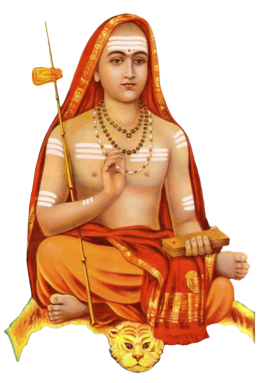प्रकाशस्वरूपोऽपि नानेव धीषु
शरावोदकस्थो यथा भानुरेकः
स नित्योपलब्धिस्वरूपोऽहमात्मा ॥६॥
prakāśasvarūpo’pi nāneva dhīṣu
śarāvodakastho yathā bhānurekaḥ
sa nityopalabdhisvarūpo’hamātmā .. 6..
English Translation and Notes based on the Bhashya of Sri Sankara
Translated by S. N. Sastri
The Self is ever the subject and cannot therefore become an object to be experienced by the sense organs. When the senses are completely withdrawn from external objects and the mind is concentrated on the Self, the Self is realized. The Kathopanishad says (II.i.1) :– The Lord made the senses outgoing. Therefore they can know only external objects and not the inner Self. A rare discriminating individual, desiring immortality, turns his eyes (i.e. all the sense organs) away from external objects and sees the indwelling Self.
When the mind becomes pure, that is to say, totally free from attachment and aversion, the Self shines by itself. Sri Sankara says in his commentary on the Brihadaranyaka Upanishad, 4.4.20 that ‘attainment of knowledge of Brahman’ (or the Self) means only the cessation of identification with external things (such as the body, mind, possessions, relatives and so on).Identity with Brahman is not some thing that requires to be newly established, because it is always there. Everyone is in reality always identical with Brahman, but wrongly considers himself to be different because of beginningless Avidya or ignorance of one’s real nature. Therefore the scriptures do not enjoin that identity with Brahman should be established, but only that the false identification with things other than Brahman should be given up. When the identification with other things ceases, the identity with one’s own Self, which is natural, automatically prevails. This is what is meant by the statement in the present verse that the Self shines by itself to those whose mind has become pure.
The Self (also spoken of as Atma or Brahman) is only one, but it appears as many because of the limiting adjunct (upadhi) in the form of the body and mind. The Self reflected in the mind is the Jiva or individual soul and, since the minds are different and many, the Jivas also appear to be many and different from one another. This is comparable to the many reflections of the one sun in the water in different containers.
How does the one Self illumine all intellects simultaneously? This doubt is answered in verse 7.
Hastamalakiyam – Verse 6 – Hastamalaka-6-ya eko vibhāti – In Sanskrit with English Transliteration, Translation, Meaning and Bhashya – Commentary by Sankaracharya – Hastamalakiyam-6

